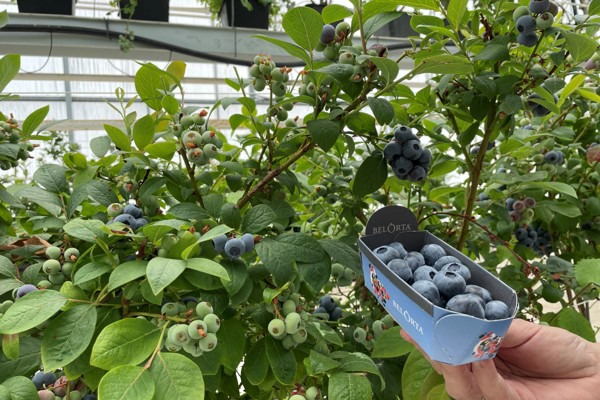"Blueberry consumption in Belgium has significantly increased over the last 10 years, yet growers have seen little benefit from this surge. The average consumer is paying less per kilo, while production costs, on the other hand, have rapidly increased." This was shared by Miguel Demaeght of BelOrta at the Studiedag Kleinfruit, (Small Fruit Study Day), organized by pcfruit.
On Friday, March 1, the Studiedag Kleinfruit took place in Hasselt. This day was primarily focused on research, but to also provide a trade perspective, Miguel was invited to speak. "On one hand, it's very important to look at how a product is grown, but it also needs to be sold. That's what I focus on every day." He then discussed the five major types of soft fruit: raspberry, blackberry, gooseberry, red currant, and blueberry. The latter stood out from a trade perspective over the last 10 years.

"In this, I actually looked at several factors. Who the consumer is, what they buy, how much they spend, and the evolution over the last 20 years," Miguel continues. "A key factor here is consumption. This is number one. Consumption has actually increased or remained fairly stable in almost all product groups. A second factor is what the consumer spends per kg of product. For strawberries, this remained fairly stable until 2021, increased during the corona period, and then flattened again. Raspberries have been at a consistent level for 10 years, and blackberries are slightly increasing. Then, however, you look at what the average consumer has spent per kilo on fruit. Production costs have indeed risen sharply, which would lead you to expect an increase in store prices. We know other factors play a role, but otherwise, viability becomes very tight. Only for strawberries and blackberries has the market price reasonably followed production cost."
Blueberries strikingly
"However, blueberries were the most striking. Consumption and market penetration have increased. Where in 2013, 10 percent of the Belgian population bought blueberries once a year, today it's 40 percent. They also spend more on blueberries in total, but the price per kilo has dropped between 2016 and 2021 and has not significantly increased since. With the rising production costs, you then enter a conflict zone. If consumers were to pay as much as they did 8 years ago, it would have already been difficult to operate profitably. If the average consumer price then even becomes significantly lower, this is certainly not to the advantage of a better price for producers. You can stimulate consumption, but if it yields less, things will eventually grind to a halt."
The reason for this, as the experienced trader states, is competition with imported product. "We'd like to spotlight local produce. In Belgium, we want to continue focusing on hand-picked, high-quality products. However, you're always faced with the prices used for imports. Many Belgian consumers also want Belgian products, but we are noticing that price pressure in the store means that this Belgian product is increasingly being edged out of the shelf. This results in us not being able to achieve the correct price for Belgian products as often as before, which is necessary to be profitable and sustainable for our local growers. This is seen less in other product groups."

Not a season like other years
"With blackberries and raspberries, we are quite present in the Belgian season and can maintain those correct prices," Miguel continues. "With blackberries, we see that consumers have started to spend a bit more in recent years. A similar situation with raspberries."
"We continue to draw attention to this and now that the spring season is coming, we maintain that focus. However, it will certainly not be a season like other years. We are currently faced with many issues. Not only in Belgium and the Netherlands but worldwide. What does the geopolitical situation do? What changes climatically and what will the water shortage in Southern Europe mean for our market? These are all factors we need to keep an eye on, but that also makes it interesting and exciting, right? We're looking forward to it," Miguel laughs.
For more information:
Miguel Demaeght![]() BelOrta
BelOrta
Mechelsesteenweg 120
2860 Sint-Katelijne-Waver, Belgium
+32(0)12 670 260
info@belorta.be
www.belorta.be
